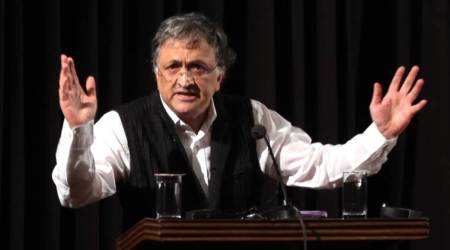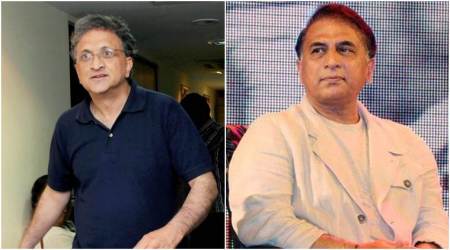 Without directly naming them, Guha trained his guns at India skipper Virat Kohli and other players in the squad, who have made their disgruntlement known about Kumble’s “overbearing” style of functioning. AP
Without directly naming them, Guha trained his guns at India skipper Virat Kohli and other players in the squad, who have made their disgruntlement known about Kumble’s “overbearing” style of functioning. AP
Kumble episode shows ‘superstar culture gone berserk’
The way in which the coach-captain rift has been handled by the Indian cricket establishment has peeved Ramachandra Guha enough for it to be one of the reasons to quit the Committee of Administrators. The eminent historian was agitated that player power has had a disproportionate influence on the matter, which can result in coach Anil Kumble not getting an extension despite a stellar record in charge, winning five Test series on the bounce.
“In a system based on justice and merit, the head coach’s term would have been extended. Instead, Kumble was left hanging, and then told that the post would be re-advertised afresh,” Guha writes in his resignation letter to CoA chairman Vinod Rai on Friday. “The Indian team’s record this past season has been excellent; and even if the players garner the bulk of the credit, surely the head coach and his support staff also get some.”
Guha takes on the prevalent superstar culture in Indian cricket, and without taking names, trains his guns at skipper Virat Kohli and other players in the squad, who have made their disgruntlement known about Kumble’s “overbearing” style of functioning. The historian believes players should not get to decide who the coach should be, or they may seek a role in the appointment of individuals higher up the BCCI hierarchy.
Guha indicated such a scenario is not amenable to the professional running of any enterprise. “Surely, giving senior players the impression that they may have a veto power over the coach is another example of the superstar culture gone berserk? Such a veto power is not permitted to any other top level professional team in any other sport in any other country,” he said.
If BCCI mandarins bow down to the superstars who are used to having their way in such matters, they may regret it as Board officials may be next in line. The players may try to get rid of anyone whose views and comments they don’t appreciate, or who stands up to their hegemony.
Guha alluded to the removal of Harsha Bhogle from the Indian Premier League commentary panel, ostensibly to satisfy certain Team India players peeved at his ‘over-critical’ comments about them. “Already, in a dismaying departure from international norms, current Indian players enjoy a veto power on who can be members of the commentary team. If it is to be coaches next, then perhaps selectors and office-bearers will follow,” Guha predicted.
The BCCI, while advertising for the coach’s post, said the timing, just before the ICC Champions Trophy, was necessitated as Kumble was coming close to the end of his one-year tenure. But Guha felt the matter could have been dealt with much better.
“In case due process had to be followed since Kumble’s original appointment was only for one year, why was this not done during April and May, when the IPL was on? If indeed the captain and Head Coach were not getting along, why was this not attended to as soon as the Australia series was over in the late March? Why was it left until the last minute, when a major international tournament was imminent, and when the uncertainty would undermine the morale and ability to focus of the captain, and the team?”
The committee didn’t take action against Gavaskar
 Gavaskar, Guha pointed out, was a BCCI commentator while being on the board of a player management company.
Gavaskar, Guha pointed out, was a BCCI commentator while being on the board of a player management company.
In his letter to CoA chairman Vinod Rai, Ramachandra Guha said the committee’s failure in stemming instances of conflict of interest — such as former player Sunil Gavaskar’s — was a major point of divergence with the rest of the members. Pointing to the example of Gavaskar, whose commentary duties are in direct conflict with his other role as head of a player management firm, Guha said despite his repeated warnings, no action has been initiated for several months.
“I have also repeatedly pointed to the anomaly where BCCI-contracted commentators simultaneously act as player-agents,” he wrote in the letter to Vinod Rai. Guha had written to the COA in an email on March 19, 2017. “Sunil Gavaskar is head of a company which represents Indian cricketers while commentating on those cricketers as part of the BCCI TV commentary panel. This is a clear conflict of interest. Either he must step down/ withdraw himself from PMG completely or stop being a commentator for BCCI,” the mail had stated.
Guha had added in the mail, that taking prompt and swift action was both just and necessary. “COA’s credibility and effectiveness hinges on our being able to take bold and correct decisions on such matters. The ‘superstar’ culture that afflicts BCCI means that the more famous the player (former or present) the more leeway he is allowed in violating norms and procedures,” he had written.
Guha stressed that one reason the issue had lingered was because several of the game’s ‘superstars’ had been guilty of it. “The BCCI management is in too much awe of these superstars to question their violation of norms and procedures,” he added in the letter to Rai. Explaining the workings of this faulty system for years, Guha wrote, “For their part, the BCCI office-bearers like to enjoy discretionary powers, so that the coaches and commentators they favour are indebted to them and do not ever question their own malpractices and mistakes. But surely a Supreme Court appointed body should not be intimidated by the past or present achievements of a cricketer.”
CoA took no action despite Dravid’s India A-IPL conflict of interest
Ramachandra Guha also criticised the lack of will of his colleagues to stamp out conflict of interest involving high-profile players-turned coaches. Guha cited the examples of a “national coach” unable to attend a camp for “young cricketers” at the National Cricket Academy in March because of his IPL commitments. Guha didn’t name the coach, but it was evident he was talking about India A and U-19 coach Rahul Dravid, who also mentors Delhi Daredevils. Guha wrote to Vinod Rai: “I have repeatedly pointed out that it is contrary to the spirit of the Lodha Committee for coaches or the support staff of the Indian senior or junior teams, or for the staff of the National Cricket Academy, to have contracts in the Indian Premier League. One cannot have dual loyalties of this kind and do proper justice to both. National duty must take precedence over club affiliation.”
“I had first raised this issue to my COA colleagues in an email of 7th February, and have raised it several times since. I had urged that coaches and support staff of national teams be paid an enhanced compensation, but that this conflict of interest be stopped… Yet no assurance was given, and no action was taken. The BCCI management and office-bearers have, in the absence of explicit directions from the COA, allowed the status quo to continue.”
Dhoni, who doesn’t play Test cricket, shouldn’t have got Grade A contract
 Mahendra Singh Dhoni
Mahendra Singh Dhoni
Taking up the issue of players’ contracts, Ramachandra Guha mentioned in his letter that the “superstar syndrome” was responsible for former India captain MS Dhoni making the BCCI’s A list. “As you will recall, I had pointed out that awarding MS Dhoni an ‘A’ Contract when he had explicitly ruled himself out from all Test matches was indefensible on cricketing grounds, and sends absolutely the wrong messages,” he says. Dhoni happens to be the only cricketer in the Grade A list who isn’t in the Test squad.
The others with BCCI top contract, that fetches them Rs 2 crore a year, are Virat Kohli, Ajinkya Rahane, M Vijay, Cheteshwar Pujara and Ravindra Jadeja. Rohit Sharma, Bhuvneshwar Kumar, Ishant Sharma, Mohd Shami and Umesh Yadav figure in Grade B and get Rs 1 crore while Grade C players KL Rahul, Wriddhiman Saha, Jasprit Bumrah and Yuvraj Singh earn Rs 50 lakhs.
Ranji players underpaid
Guha also expressed his concerns over the meagre compensation meted out by the board to domestic players. “Shockingly, Ranji match fees have remained at a very low level (a mere Rs 30,000 odd for each day of play); moreover, cheques for match fees sent by the BCCI are sometimes not passed on by state associations to the players.”
CoA remained silent even as banned officials attended meetings
 Guha says the BCCI took several decisions without keeping the CoA in the loop.
Guha says the BCCI took several decisions without keeping the CoA in the loop.
Ramachandra Guha expressed his dismay at former BCCI office-bearers, disqualified by the Supreme Court, repeatedly defying the bans and attending board meetings. BCCI strongmen such as N. Srinivasan and Anurag Thakur have been barred by the apex court, but they are constantly on the lookout for avenues to exert their influence on cricketing matters. Srinivasan even proposed a boycott of the ICC Champions Trophy when the ‘Big Three’ revenue sharing model, championed by him was dismantled by the Shashank Manohar-headed ICC.
“These disqualified men are openly attending BCCI meetings, claiming to represent their state association, and indeed played a leading role in the concerted (if fortunately in the end aborted) attempt to get the Indian team to boycott the Champions Trophy. Guha believes the CoA should not “have stayed silent and inactive when the Supreme Court judgement was being so flagrantly violated by people clearly disqualified to serve as office-bearers of state or even BCCI-run cricketing bodies.”
“The CoA did not bring them to the notice of the Court, and did not issue clear directions asking the offenders to desist either.” Guha also complained about being kept in the dark while several decisions were taken on the CoA’s behalf. “Between meetings, perhaps there was not adequate consultation, and there were several crucial decisions made where all CoA members were not brought into the loop.”
Wanted Srinath in committee
Ramachandra Guha wanted a male cricketer in the Committee of Administrators. In his resignation letter, he had mentioned that he had put forth the name of former cricketer and match referee Javagal Srinath’s name, but, like several other suggestions his, went unheeded. As it unfolded, it was among the several reasons that prompted his resignation. In fact, this was one of his earlier suggestions to the COA. In a letter dated February 1, weeks after the COA was constituted, he had written to them regarding the inclusion of male cricketer, “either as a member or a special invitee.”
This, he felt “would greatly enhance both our credibility and ability to make informed decisions,” he observed.

